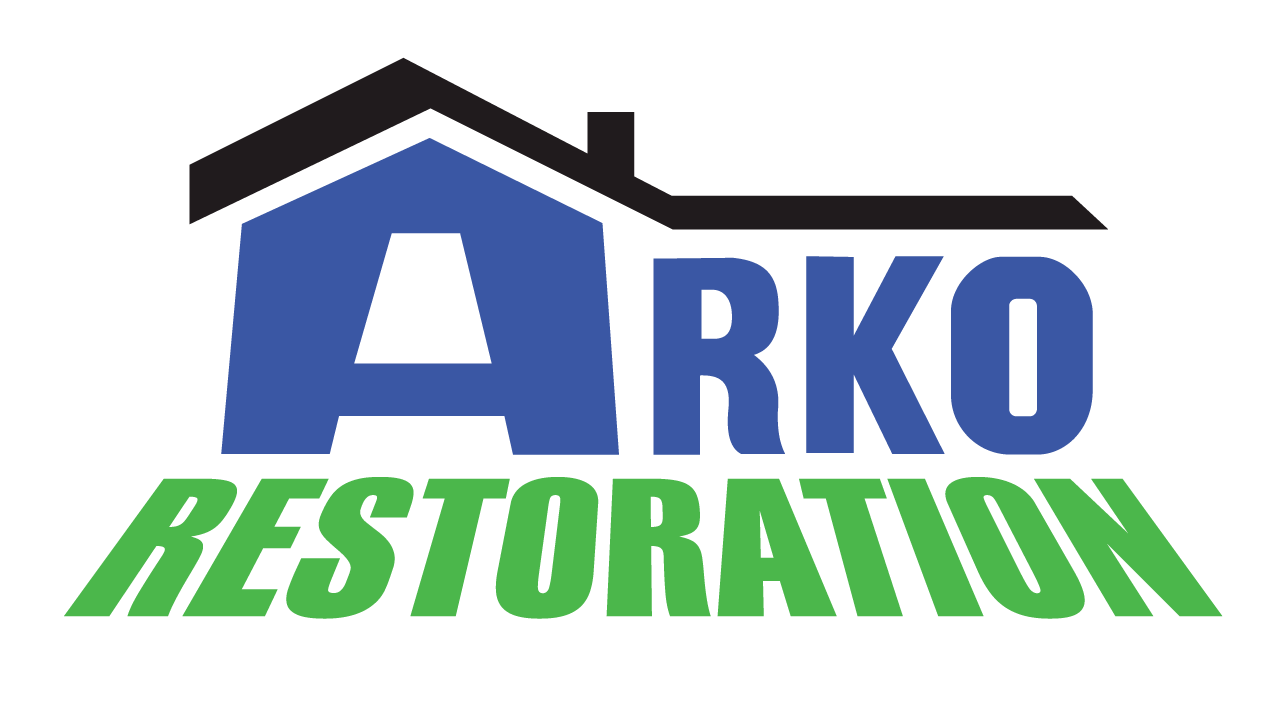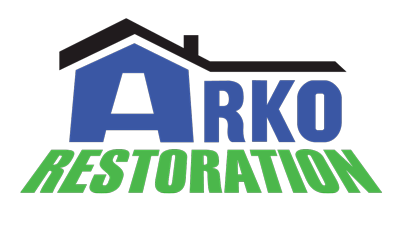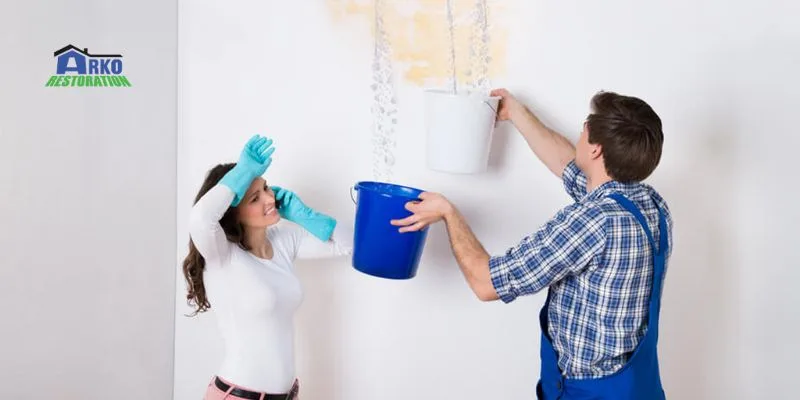Homeowners face difficulties during winter due to the onset of low temperatures, which are accompanied by rains that cause damage through erosion and flooding. It is important to act fast in the mitigation of water damage, whether it results from burst pipes, ice dams, or leaks. In this guide, we look into the causes of winter water damage and ways of preventing it.
What Are the Causes of Winter Water Damage?
Winter damage is common, and winterizing your plumbing will free you from both cleanup and potentially huge restoration costs. Lack of preparation of your plumbing for winter may result in numerous problems. To know what to do beforehand, here are the common causes of winter water damage:
- Burst pipes: High pressure of water in the frozen pipes can make them burst with an ensuing leakage and water damage. A lot of danger is presented, especially with old houses that use corrosive pipes made of galvanized steel or cast iron as the plumbing system. The worst-case scenarios include the destruction of buildings and flooding.
- Ice dams: Icicles are commonly seen in roofs, gutters, and also on trees during winter seasons. Icicles may appear normal but have risks. Ice dam formation takes place because of gutters that are blocked and mainly filled up during snow melt. Ice dams as well can also cause winter water damage.
- Roof leaks: Gutters may become clogged, which in turn leads to a leakage of roofs in winter. Interior water damage is also caused by melted snow getting into your house. It is important to provide timely attention and keep your living places intact to avoid additional damage.
- Leaks from outdoors: Similar to burst pipes, outdoor fixtures like garden hoses and spigots may leak when frozen during cold seasons. Protect your property by draining long-term outdoor water sources like a pond or pool before your first snowfall to avoid damage.
Best Practices and Proactive Measures to Prevent Winter Water Damage
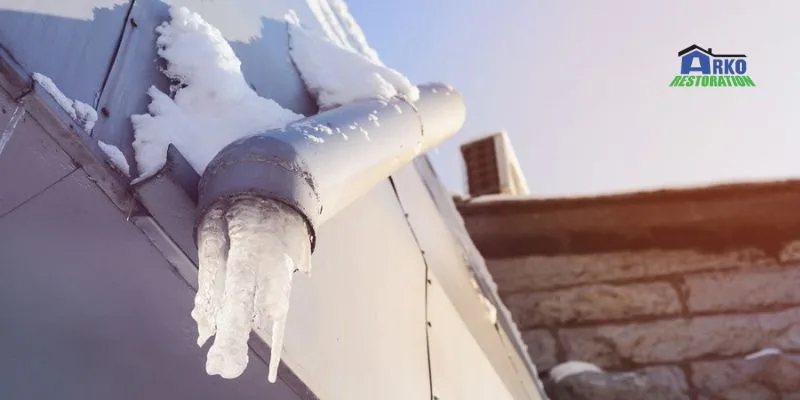
Specifically for winter water damage, the adage “Prevention is better than cure” is very correct. Preparation is quite important, especially starting from late summer and up to autumn. These potential damages are quite serious, with the worst possible one compromising your foundation.
Do not worry as a homeowner, here are best practices and proactive measures to prevent winter water damage:
1. Frequently clean roof and gutters
It is important to ensure that the gutter remains free from debris to avoid icicle formation and ice dams. Ensure that downspouts are free of obstructions regularly and clear away any obstruction quickly. Routine roof cleaning is necessary to avoid collapse which gets compounded by accumulation of rotten leaves from last season.
Clearing of surrounding trees should also be done as well as elimination of fallen fruits or leaves along the line. You should also clear the drainage pathway to ensure unobstructed flow of water. Proactive measures protect against winter-related water damage to your property and reduce the risk of debris buildup in gutters and on roofs.
2. Insulate your plumbing system
During winter, the most common issue that affects your plumbing system is frozen pipes. Avoid this problem by insulating the entirety of the house plumbing. Ensure the plumbing is located in an uninsulated space and cover the same with very well-insulated blankets.
Make sure that heat moves freely in bathrooms by leaving the doors open and that there are no obstructions to the kitchen. Such proactive measures will reduce the chances for frozen pipes; the house will continue to operate properly, and be heated during the wintertime.
3. Use thermostat
It is important to be vigilant against winter water damage, as we have cold temperatures for both day and night. To avoid frozen pipes, keep the thermostat setting consistent throughout the winter. You should keep all doors open for rooms that do not individually have a thermostat, yet connected to the plumbing system.
If you want to prevent the potential damage of frozen pipes and protect your property from the severe cold of winter, you must maintain a consistent temperature for air and ensure that there is proper air circulation.
4. Install water leak detectors
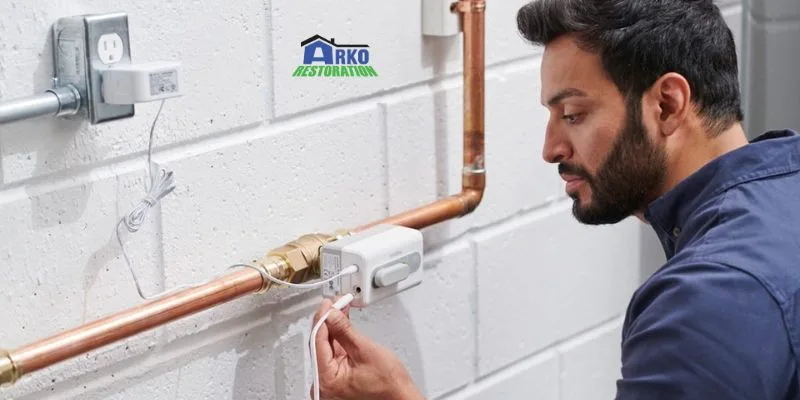
Although leakage usually goes undetected, it is crucial for the maintenance of your plumbing integrity. Fortunately, one does not need to spend much to acquire water leak detectors nowadays. Buying one and placing it close to your plumbing might change everything.
These detectors are like watchful guards that warn you of any leakages before they become big problems. Adopting this precautionary action gives your property a sense of calm and helps you handle plumbing problems promptly. Therefore, you will be able to spare your home from water destruction and subsequent catastrophes.
5. Disconnect the outdoor water systems
You need to protect your water supply against extreme cold. Detach hoses and disconnect water supply valves if you do not want to freeze the pipelines. Whenever possible, disconnect fountains and electric waterfalls. Whereas for ponds, always consult professional maintenance crews to make sure that all the fish survive when a filtration system is stopped.
These measures are proactive and guard against damages that may be caused by the winter. They protect your water features and also prevent any complications.
6. Change old pipes
It is important to consider replacing old pipes to prevent winter water damage. Old pipes have a high tendency to freeze and burst, causing expensive repairs and may even destroy some of the property. Upgrading a plumbing system strengthens it against low temperatures by minimizing cases of bursts and leakages in the winter season.
Proactive replacement is also a strategy for protecting your water system infrastructure, thus ensuring its reliability for prolonged operation. Replacement of old pipes with modern ones reduces the chances of freezing in winter and also enhances the entire efficiency and longevity of the plumbing system.
Conclusion
Protecting your property against winter water damage involves preventive steps as well as prompt remediation processes. It is necessary to provide timely insulation, regular inspection, and prompt response to leaks. Adherence to these best practices will help minimize the effects of winter-related water damage on your residential, commercial, or industrial structure.
